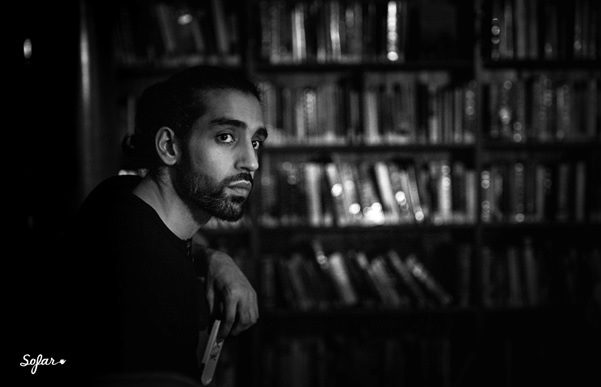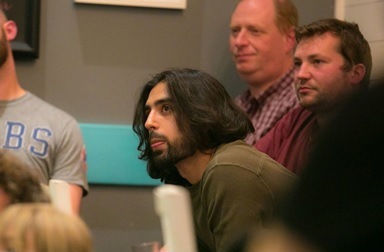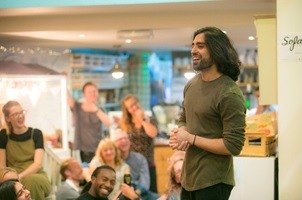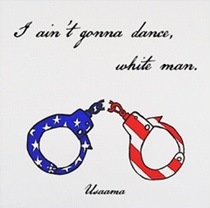AN INTERVIEW WITH USAAMA MINHAS
By Prabhjot Kaur

Photography credit: Sofia Georgio (for Sofar Sounds London)
Usaama Minhas is a poet and MC based in London. He started writing in his teens whilst going to school in Boston (Lincolnshire, UK) before leaving to spend a year at an actor training conservatory for theatre, film and TV in New York. There, he performed poetry at the Nuyorican Poets Café and the Pyramid Club. He returned to the UK to pursue a career in Hip-hop music and, in 2013, released the Hand in Hand EP, his self-produced album combining Rap music and Spoken Word poetry. Later that year, Usaama won the ‘Britain’s got Bars’ rap battle tournament at French Montana’s show at the O2. In 2015, he took a break from music to focus on creating poetry, going on to win many poetry slams in 2017, including the Hackney Hammer and Tongue, Kat Francois’s WORD4WORD, and the Genesis Poetry Slam (May). He went on to become the Hammer and Tongue National Slam Champion in 2018.
You started writing in your teens, what were your creative influences?
At the time it was a lot of music, a lot of hip hop music. A friend of mine used to listen to Tupac and so I ended up consuming his whole catalogue. A lot of people know two or three songs, but I just listened to everything. I was listening to a lot of different types of music, but in terms of writing, hip hop was the biggest cue I took.
So, your first influences were more musical than literature based?
Yeah, a lot of people around me at that age were listening to poppy or club music, in hip hop I just found a lot more substance and things I could relate to. The spirit of protest present is what I found really interesting. If you look at how Jay-Z or Nas writes, it’s super intricate and efficient and economical, and their ability to communicate things in four lines that might take someone else forty lines is phenomenal. 2017 onwards, I focused on just becoming an economical and efficient writer. I’m writing a poem instead of an article or a novel, and it requires a skill of precision – I want to provide a headshot, to use a crude analogy.
How long have you been writing/performing for?
I’ve been performing on and off for about nine years. I professionally took it up in 2012 but there was a long period when I didn’t do anything, but towards the end of 2016 I picked it back up again.
You won a lot of poetry slams in 2017, what was that like for you?
At the time it acted as validation because I was making a move from music to doing poetry by itself. It was cool, but I was very aware my writing needed to improve. I didn’t want to be a rapper who rapped without a beat, which is what my earlier work was like. I wanted to be more distinct than that. I didn’t want to rhyme for the sake of rhyming, there’s a lot more going on in my poetry than that, and I get to do all that intricate, lyrical stuff in my raps anyway. Making that move, performing solely for the sake of poetry and being acknowledged for it was comforting. I had a chip on my shoulder that I wasn’t really qualified for doing this, so it gave me validation on a personal level.
Your poetry provides a commentary on social/racial stereotypes, sometimes in a comedic way; tell us more about this.
Humour just works. You can use it to make statements without people realising you’ve made a statement. People agree to things they don’t realise they’re agreeing to by virtue of them laughing at your joke. Sometimes they’re the butt of the joke but they’re laughing and appreciating the message. It’s all about finding points of connection and making people empathise. Comedy accomplishes that entry point – if you’re likeable, if somebody laughs with you then they’re going to listen to what you have to say. What happens a lot of time with us – and by ‘us’ I mean black and brown people – when we’re on stage or in any position, what is in reality pain and justified rage appears to others as irrational hatred and anger. So, when I’m speaking to crowds that might not have ever seen someone like me perform before, I’m conscious of the strategy I use to make myself human first, but I try not to think in those terms too much. I don’t want to have to perform my humanity.
What was it like winning the 2018 Hammer and Tongue National Slam Champion title?
Hammer and Tongue was a national competition, so winning that was significant on a more symbolic level. For someone who looks like me, has my background and was speaking about the issues that I was speaking about on that stage and the stages that led up to that final, it was cool that the audiences present were essentially choosing this person, these poems, these messages as being representative of British culture and also as something they wanted to applaud and hold up.
What would you say is the difference between spoken word and rap, if any? And do you have a preference of one over the other?
What’s different for me is my approach when I’m creating. With raps, my approach is for it to be technically proficient and economical, in terms of rhyme, cadence, double entendre, metaphor, simile – it needs to be a tight piece of writing that is comprehensive and cohesive in tackling the subject matter. With rap there are certain constraints, like weaving a narrative within sixteen bars. Even the music itself is an inspiration. With poetry, you write the piece and edit it down until it’s polished. You have to figure out how to perform it, where you’re pausing, where there’s emphasis. You’re not aided by music in any way. Honestly, I don’t know which I like better. I like performing without backing tracks and the challenge of seeing what I can do with my body, voice and words, and the audience’s reaction, and not having a beat take them anywhere but just having what I’m doing take them to that place.

Photography credit: Opaluwah Photography
You speak Urdu, Arabic and Punjabi – have you performed or thought to perform in other languages?
I speak fluent Urdu – it’s my first language – and understand some Arabic and Punjabi. I’ve written a couple things in Urdu, but my ability to communicate emotions and thoughts, philosophise and give clarity is a lot better in English – this includes things like slang and colloquialisms. I also think my grasp of Urdu and study of Arabic grammar, in particular, has encouraged me to play around with things like syntax and sentence structure – and this has also been largely due to studying great Hip Hop writers and observing the particularities of Ebonics [African-American Vernacular English] and other languages, dialects and colloquialisms. I’m open to writing in Urdu again at some point, but more so in music than poetry.
You lived in Boston, then New York before moving back to the UK – how has that shaped your experiences and writing?
I lived in Boston, UK. I basically didn’t like school, dropped out of secondary school and went to New York to go to acting school. I’m based in London now, which, for the purpose of what I do, is really useful. I see a lot of parallels between experiences people have in different places, sometimes I’ll write in a way that is broader than the experience I’m reflecting on so that people can relate to it.
You’ve been performing for nine years; would you say the themes you talk about have changed over that time?
I would say they have broadened considerably rather than changed. There are topics that I will tackle now that I didn’t feel equipped to deal with before. I am no longer interested in censoring myself or looking pretty, I’m more interested in exploring and showcasing my humanity and the discomfort of getting into those parts that are difficult.
Would you try your hand at writing in other forms?
I began to write a short story, didn’t finish it. Began writing a script, didn’t finish it. For the most part it’s been poems and songs. I’ve been asked to write a book of essays, but I don’t know if I will. I’m more interested in writing in poem form. I would like to write a screenplay one day because I really enjoy reading scripts and plays.
What do you think makes a good spoken word performance?
The performance needs to be good, needs to be captivating and communicative. The piece should also be good just as a piece of writing. There are so many different performance aspects you can play with, like proximity to the mic, tone of voice, body language, using silence and pauses between words, how you deliver jokes or heavier lines. Different poems call for different ways of being performed.

Photography credit: Opaluwah Photography
Do you have any upcoming spoken poetry events or projects?
I’m performing a thirty minute set at the BHAC poetry festival which is on from 2-7PM on Sunday the 24th November. I will probably do a bunch of shows in the summer. I’m looking to release an album’s worth of music this year. My new single, ‘I ain’t gonna dance, white man.’, comes out on Friday 26th July and I’m excited to see how people react to it.
Do you have any plans to bring out a poetry book one day?
I didn’t, and then I did, and now I think I don’t again. I don’t know if I’m qualified – a friend of mine called Tyrone Lewis just released his book called Blackish – there are amazing writers like him who have been dropping stuff. I thought about it a lot and it makes sense for me to, but I’m not sure if I know enough about page poetry to yet.
Can you offer any tips or advice for aspiring poets?
The first thing you can do is claim the title, call yourself a poet, or a writer – that’s the biggest thing you can do. Quality can be found in the quantity, instead of as opposed to it, so write as much as you can. Just write and you’ll get better and find something that works. Make sure your writing is as economical as possible, make sure every word serves a function and trim everything else off. For people contemplating performing, just take the leap. If you’ve written something, there’s a reason it needed to come out of you. There might be a reason why someone else needs to hear it too.
Usaama’s new single, ‘I ain’t gonna dance, white man.’, came out on Friday the 26th July 2019.
Check it out here.
He can be found on Instagram, Twitter and Facebook as @yoUsaama.
.
.

